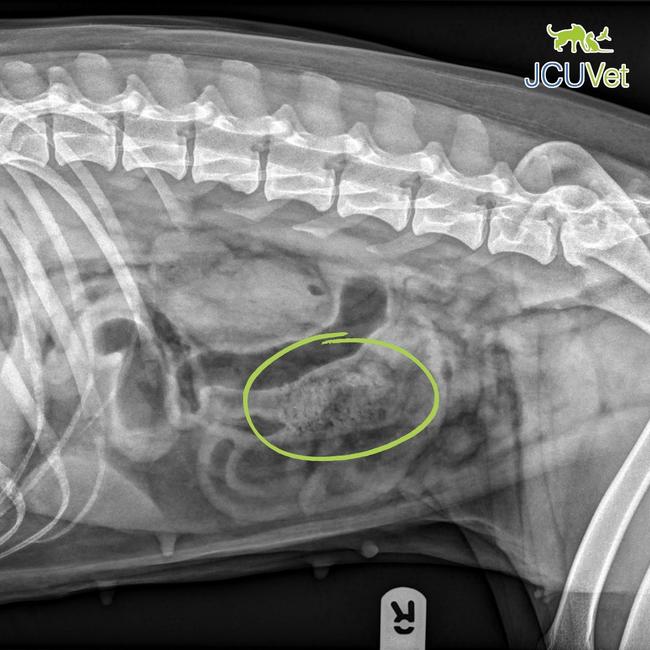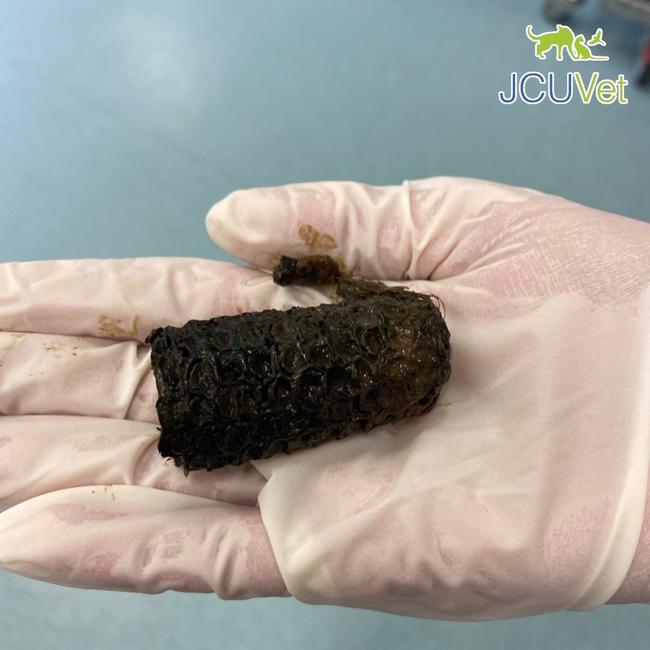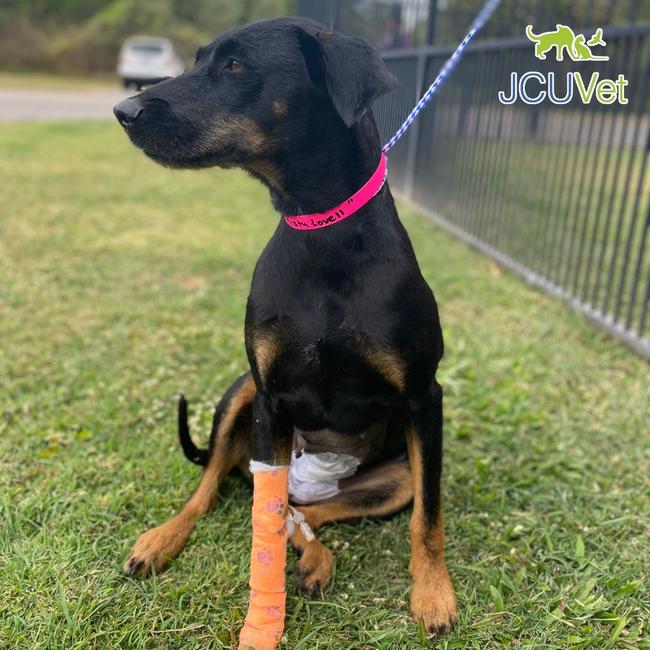Dinner time foods that could kill your dog
A Queensland dog has had a lucky escape after she was fed a seemingly innocuous food that forced her to undergo emergency surgery.
QLD News
Don't miss out on the headlines from QLD News. Followed categories will be added to My News.
A Queensland dog has had to undergo emergency surgery to remove some food that was obstructing her intestines.
After vomiting and feeling flat, Misty the dog was brought into Townsville’s JCU vet where, upon examination, the vet’s noticed her belly didn’t look very “comfy”, so they took her for an X-ray.
SCROLL DOWN FOR A LIST OF FOODS THAT ARE BAD FOR YOUR DOG

To their surprise they found a corn cob stuck inside Misty’ intestines which had reportedly been stuck there almost three weeks.
“As yummy as they are, unfortunately, corn cobs are the perfect size and shape to get lodged in the intestine and cause an obstruction,” a JCU Vet spokesperson said.
“Sometimes when animals eat something they shouldn’t, it can stay in the stomach and not cause too much of a ruckus until days or even weeks later when the body tries to pass the object through the narrower opening of the intestines.”

Misty was lucky to have been able to swallow the corn cob as it presents a choking hazard for pets that could prove fatal, but she was unable to pass it and was instead taken to surgery.
Dr Gillian and Dr Elise from JCU vet successfully removed the corn cob and Misty was able to return to her happy normal self.

HUMAN FOOD THAT IS BAD FOR DOGS
Chocolate
However enticing chocolate is for humans and dogs alike, chocolate is another poisonous food for dogs. Chocolate contains stimulants called methylxanthines and particularly theobromine, which can cause diarrhoea and vomiting in small amounts and seizures, irregular heart function, frequent urination, tremors, restlessness and even death in larger amounts.
Cocoa powder has the highest concentration of theobromine, followed by unsweetened baker’s chocolate, semisweet and dark chocolate.
Onions, garlic and chives
The onion family is bad for dogs, regardless whether they are raw, cooked or dry. Disulfides and sulfoxides (thiosulphate) in this can cause anaemia, vomiting and poisoning.
Macadamias
Macadamia nuts contain a toxin that can affect your dog’s muscles and nervous system, which can result in vomiting, muscle shakes, increased temperature and weak back legs.
Corn on the cob
As you can see in the photos, although the corn is digested by dogs, the cob can cause a blockage in the intestine. Feeding your dog corn on the cob can potentially be fatal, so just don’t do it.
Walnuts
Other nuts, including almonds, pecans, and particularly walnuts, contain high amounts of oils and fats which can cause vomiting, diarrhoea and rarely pancreatitis.
Avocado
A substance called persin, found in these fruits, can make your dog vomit or get diarrhoea or heart congestion in severe cases. The seeds can also cause blockages and have the highest concentration of persin.
Alcohol
Alcohol can make a dog vomit and develop diarrhoea, breathing problems, coma and even death in large amounts. The smaller the dog, the worse.
Caffeine
Caffeine is lethal for canines, regardless whether its in a drink or food. Never give your dog coffee-flavoured ice creams or drinks. Make sure you discard used coffee grounds and keep bags of coffee out of your dog’s reach. If ingested it can make them hyperactive, restless and even cause them to die.
Nicotine
Nicotine can also kill dogs. Symptoms include vomiting, abnormal heart rate, tremors and weakness.
Grapes and sultanas
No one really knows why grapes and particularly sultanas are poisonous to dogs. But make no mistake grapes and sultanas can cause kidney failure, even if only one or two sultanas are eaten. Vomiting is an early symptom followed by depression and low energy.
Sugar
Too much sugar for your pup can lead to dental issues, obesity and even diabetes.
Citrus
The stems, leaves, peels, fruit and seeds of citrus plants contain varying amounts of citric acid, which can cause irritation and possibly even central nervous system depression if ingested in significant amounts. Small doses, such as eating the fruit, are not likely to present problems beyond minor stomach upset.
Coconut, Coconut Oil
When ingested in small amounts, coconut and coconut-based products are not likely to cause serious harm to your pet. The flesh and milk of fresh coconuts do contain oils that may cause stomach upset, loose stools or diarrhoea.
Milk and Dairy
Because pets don’t possess significant amounts of lactase (the enzyme that breaks down lactose in milk), milk and other dairy-based products cause them diarrhoea or other digestive problems. It won’t kill them, but be prepared for your dog to turn into a farting machine.
Salt (i.e potato chips, pretzels and salted popcorn)
Large amounts of salt can produce excessive thirst and urination, or even sodium ion poisoning in pets.
Yeast dough
This can rise and cause gas to accumulate in your pet’s digestive system. This can be painful and can cause the stomach to bloat, and potentially twist, becoming a life threatening emergency.
Chewing gum, toothpaste, mouthwash
These often contains xylitol. In dogs, xylitol is quickly absorbed into the bloodstream, which causes the pancreas to release insulin which can cause a rapid decrease in blood sugar (hyperglycaemia) and possible liver failure. Xylitol (artificial sweetener) can be found in baked goods, some types of peanut butter, chocolate.
Cooked bones
Don’t feed you dog cooked bones, especially cooked chicken. Cooked bones can easily splinter your dog when they chew and can puncture their intestines once swallowed.
Fat Trimmings
Cooked and uncooked fat trimmings can cause pancreatitis.
Raw Fish
Raw meat and fish can be contaminated with bacteria which causes food poisoning.
Raw eggs
Raw eggs can cause salmonella food poisoning if not fresh.
What should I do if my dog has eaten any of these?
Call or take your dog to the closest vet immediately. If consumed, even small amounts of these items can be fatal.


